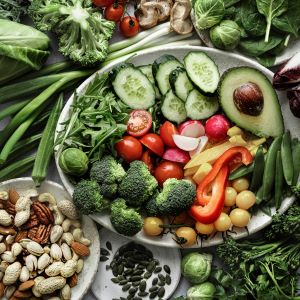Plant-based, Plant-forward: A Cautionary Tale
by Reed Mangels, PhD, RD
One of my neighbors, who knows I’m vegan, recommended a new local restaurant, saying, “It’s really good and they say it’s plant-based.” Being a bit skeptical, I checked the restaurant’s menu on-line. They had dishes featuring local, seasonal, organic produce – lots of plants – but every single dish had beef, pork, chicken, fish, or cheese as an integral part of the dish. Yes, their dishes could be said to be based on plants but there was nothing there that I would eat. There are many other restaurants in the area that are vegan, have a vegan menu, or clearly indicate vegan items so I didn’t feel the need to explore with this restaurant the possibility of their preparing a vegan dish if I ate there.
Then, I was poking around the new books shelf at the library and found a large, shiny new cookbook promising “plant-forward” recipes. Again, lots of vegetables but also many recipes that included meat and/or dairy products. Yes, this kind of cookbook could be helpful for someone trying to reduce meat and eat more vegetables, but it wasn’t the vegan cookbook I was looking for.
Coincidentally, the same week that I had both of these experiences, I was preparing a webinar on vegetarian nutrition for dietitians and dietetics students. I wanted them to be aware of the different meanings that “plant-based” and “plant-forward” can have and did a quick internet search. Here’s what I found:
“Plant-based or plant-forward eating patterns focus on foods primarily from plants. This includes not only fruits and vegetables, but also nuts, seeds, oils, whole grains, legumes, and beans. It doesn’t mean that you are vegetarian or vegan and never eat meat or dairy.” Harvard Health Blog
“A plant-based diet consists of exclusively plant foods, including fruit, vegetables, grains, and legumes, and avoids meat, dairy, and eggs.” PCRM
“Plant-based diets constitute a diverse range of dietary patterns that emphasize foods derived from plant sources coupled with lower consumption or exclusion of animal products. Vegetarian diets form a subset of plant-based diets, which may exclude the consumption of some or all forms of animal foods.” World Health Organization
Clearly, there is not consensus on what these terms mean.
My advice to practicing and aspiring dietitians? If someone says that they follow a plant-based or plant-forward diet, ask more questions so that you can be confident of which foods they eat and which foods they avoid.
My advice to those looking at restaurants, cookbooks, and food packages? If it says it is plant-based or plant-forward, ask more questions so that you can determine if a product or establishment meets your needs.
To read more about the phrase “plant-based” see:
What Does Plant-based Actually Mean?
What Does Plant-based Mean to the Public?

